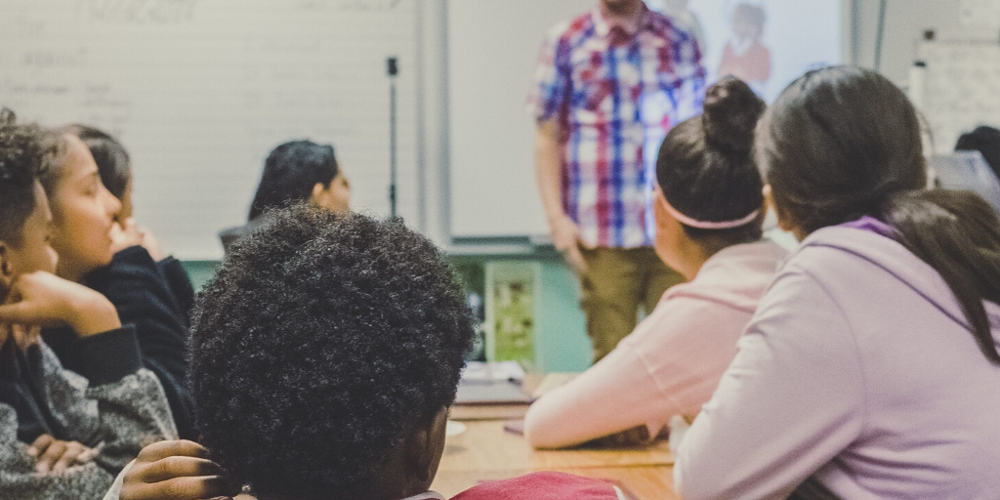Grade-level reading and thinking enhances grade-level learning.
Our journey as educators begins with us. We endeavor to learn our content and context so we can teach our students about the world around them while encouraging them to see themselves as leaders in it. As the pandemic continues, we are reminded of how challenging that can be, particularly in the context of disrupted schooling; this disruption is but one in a long line of structural inequities that marginalize so many of our students. In this election and census year, millions of individuals will vote and/or complete surveys as they participate in our democratic practices. Unfortunately, many others will be left on the sidelines to watch as the world moves forward without them. Our paper, “Equitable ELA Instruction” lays out some helpful and vital ways we can all disrupt that slow, structural push to the sidelines and instead bring all students forward.
Learning takes place in the productive struggle.
Alice Wiggins, Josh Parker, Brandon White, and Jason Schweid collaborated on this paper to raise awareness of three key “moves” that define equitable ELA instruction within our UnboundEd community of educators and beyond. While the key ideas in the paper were developed before COVID-19, they are essential to consider for remote instruction, as well as for recovery planning. We believe grade-level texts and tasks—expertly delivered and supported—are key to ensuring all students meet their potential. To move toward grade-level expectations, educators must provide instruction that keeps students immersed in grade-level reading and thinking. This instruction includes opportunities to develop and become proficient in the performances described by the standards.
The most efficient path to effective and equitable instruction requires educators to do three things:
1. Adopt aligned curriculum.
2. Provide instructional support that fosters all students’ persistence with grade-level reading and thinking.
3. Provide targeted intervention in addition to and in service of grade-level learning.
It is imperative that educators not only do these three things, but also ensure that they work together. Creating and communicating a seamless vision of equitable ELA instruction ensures that teaching and support are aligned in the most equitable ways. As COVID-19 forces us to consider how we can restructure school to better meet all children’s needs, we have new opportunities to follow this path to effective and equitable instruction. There is a paradox associated with supporting students who are not yet reading and working to grade-level expectations. Intuitively, educators often bring the work to a level at which students can experience success. However, the real benefits and opportunities for growth come from bringing students to the work of the grade. As adults, we are in the midst of this productive struggle as we simultaneously wrestle with trying to meet student needs from afar and plan for a return to face-to-face instruction that may initially be sporadic. Learning takes place in the productive struggle. And this struggle, for both adults and students, will take place in the intersection of the standards and equity that is essential for closing the opportunity gap caused by systemic bias and racism.
Download the Paper
Engage with us on our socials. We’d love to hear from you.
Meet our UnboundEd team behind “Equitable ELA Instruction.”

Alice Wiggins
Senior Director, ELA
Alice Wiggins has directed initiatives at the national level related to P-3 ELA curriculum implementation and support. As senior director, ELA, she is responsible for ELA partner engagement work, curriculum development, and supporting professional development programs for the Standards Institute. Alice was previously executive vice president of the Core Knowledge Foundation and previously served as associate director of the Preschool Language and Literacy Lab at the University of Virginia. She is also the author or co-author of a number of publications including the Core Knowledge Preschool Sequence and Teacher Handbook; Preschoolers at Play: Building Language and Literacy through Dramatic Play; Scaffolding With Storybooks: A Guide for Enhancing Young Children’s Language; and Literacy Achievement and Assessment in Emergent Literacy. Alice’s interests and expertise in education are enhanced by her 15 years as a consultant and project manager in the private sector.

Josh Parker
Director, Program and Engagement
Josh Parker’s mission in education and life is to “help people and solve problems,” and throughout his career, he has achieved both goals. He served students and teachers in the Baltimore/Washington D.C. corridor as an English Language Arts (ELA) instructional coach, Language Arts department chair, Secondary Language Arts teacher, professor, and compliance specialist. As the director, programs and engagement, Josh serves teachers, administrators, and educational leaders by providing high-quality professional learning experiences at the Standards Institute, Leadership Fellowships, and Communities of Practice. He is a Teaching Channel Laureate, Education Week writer, a Lowell Milken Unsung Hero (2017), N.E.A. Global Fellow (2013), and the Maryland Teacher of the year (2012).

Brandon White
ELA Specialist
Brandon White is a former middle school ELA teacher and Restorative Practices educator for the Rochester City School District. As a student, Brandon found that he could connect with the instruction through the language and culture of hip-hop; as an educator he would study how to provide cultural relevance and responsiveness through pedagogy and content. As an ELA specialist, Brandon selects, adapts, and sequences open educational resources and supports the creation of professional development materials and resources. In addition to providing these elements via traditional school settings, he has worked for seven years as a servant leader intern and site coordinator for Children’s Defense Fund Freedom Schools Summer Literacy Programs located in Rochester. He has also advocated for these practices through his participation in the Bill and Melinda Gates Foundation’s Teacher Advisory Council and through providing professional development at BMGF-sponsored Elevate and Celebrate Effective Teaching and Teachers (ECET2) Conferences.

Jason Schweid
Executive Director, Research, Design and Strategy
Jason Schweid is a research scientist, expert in Evidence-Centered Design, Validity Theory, and assessment policy. As executive director, research, design and strategy, Jason leads design and evaluation of all UnboundEd products and services. In addition, he serves as a general research methodology resource for UnboundEd and partner organizations. Previously, Jason was a fellow for assessment at the Regents Research Fund, where he led the redesign, development, implementation and research for the New York State Testing Program and the New York State Teacher Certification Examinations. Jason’s research appears in journals including Teachers College Record, Educational Assessment, Evaluation and Accountability, and Journal of School Counseling. He started his career as a public school teacher, first in South Texas and then in Harlem.
